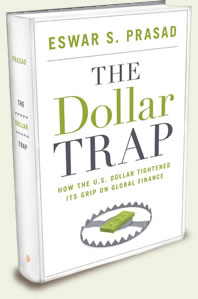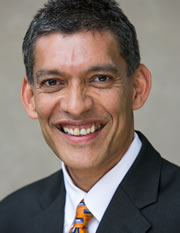Here’s why the dollar’s demise is overstated
By Howard Schneider
Whether the trouble in emerging markets is a tremor or the prequel to a shock, it underscores where the U.S. currency stands after a recession and crisis that some thought would prove its undoing: still on top.
Cornell University professor Eswar Prasad has spent a long time thinking about the dollar’s role in the wake of the Lehman meltdown. He is a former China director for the International Monetary Fund, so he has a natural interest in the issue, since China’s renminbi is one of the currencies that might eventually emerge to challenge the dollar as a world reserve.
His conclusion?
“The system is so rigged, the U.S. wins no matter what,” Prasad said Wednesday night at a reception to discuss his new book, “The Dollar Trap,” which develops the argument in detail. The thrust of it is that when times are good, the U.S. economy is attractive in its own right — people buy a lot of stuff from overseas, other countries are happy to lend money to finance those purchases, and demand for dollars is strong. And when things are not so good, the United States is still the only place large enough to absorb the world’s spare change and (critically) that is trusted enough to pay it back.
Even when there was a slight risk of default on U.S. debt last year, some U.S. bond yields dropped, which to a treasurer in any small country must seem both perverse and unfair.
Three points stand out:
1) The revolution won’t be televised because there won’t be a revolution: “It is very difficult to lay out a scenario where things come apart in a way that hurts the dollar.”
2) Size matters: You can always buy dollars. And in a pinch, the rest of the world can look to one central banker to chart a response – say by printing lots more. That may be scary. But it’s efficient.
3) This all may not be a bad thing: Sure, Prasad and others argue, the advantages of issuing the world’s currency may make the United States slack in other ways, and its dominance has proved a gnarly source of spillovers to the rest of the world. Plus, low interest rates encourage overspending here. But if the dollar didn’t exist, someone would have to invent it, and, at least so far, no one is banking on Bitcoin to achieve universality.

